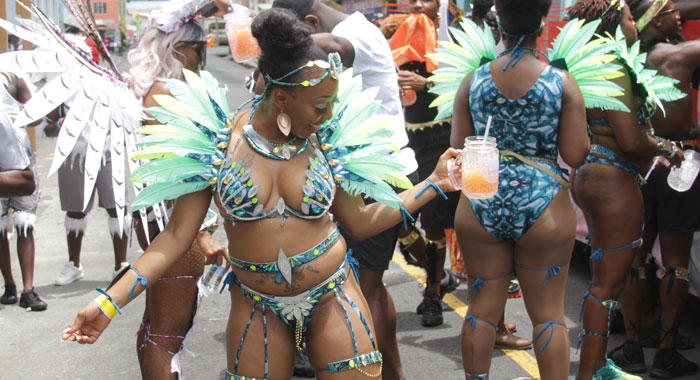A Vincentian historian says it is questionable that St. Vincent and the Grenadines has yet to research the impact of carnival on its economy, as has been done in other Caribbean countries.
Cleve Scott, who lectures in history at the University of the West Indies Cave Hill Campus in Barbados, explained that the focus on carnival as an economic activity began in Trinidad and Tobago in the 1920s.
“But you know, we didn’t do that until 1977, when we decided to change it from the pre-Lenten to the summer,” he said of the Vincentian carnival, Vincymas.
“So, since 1977, we basically recognised the value of carnival as a form of income generation for the wider population and the nation-state,” he said recently on NICE Radio’s “Calypso Culture”.
“Unfortunately, in St. Vincent and Grenadines, we haven’t done recent research to quantify the impact. And that is questionable why we haven’t done that.”
He said that after the Trinidad and Tobago carnival earlier this year, Port of Spain said the festival had contributed TT$1.6 billion (about EC$800 million) to the economy.
St. Lucia has been reporting significant growth in its carnival, Scott said, adding, “And we know St. Lucia has gone a bit further and they have now embraced what we call festival tourism.”
He said Castries has had its Jazz Festival for a while, which it has ramped up, in addition to its creole festivals, such as the La Rose Flower Festival.
Dominica has its Creole Festival and also reported growth in its carnival.
“Antigua has reported tremendous growth in the carnival over the last couple of years — growth up to 10 to 15%,” Scott said, adding that that he did not want to “kill” his listeners “with the fine stats”.

He said Barbados has a festival every month, adding that Crop Over, the Barbadian carnival, is number two behind Trinidad and Tobago “and it can get bigger”.
“So, we are talking here, what we call today the cultural industry. And that incorporates things like fashion books, movies, music, and so on,” Scott said.
He said carnival is a festival that incorporates the elements of the cultural industry.
“When people come to a show, they dress a particular way. Never mind they might go to a wet fete in a vest. But there are those shows … that people buy specific outfits to go to.
“We could do the comparisons to the reggae shows or the dancehall shows. People buy new sneakers, new jeans, and that kind of thing.
“So, carnival is a time where all sectors of the economy get stimulated — from transportation, food, accommodation, construction, all sectors including the medical sector.
“Because whatever little misdemeanours you have, people have to get treatment. You might eat too much or you might drink too much, and so on. I’m not talking about anything bad,” Scott said.
In June 2029, then Minister of Tourism and Culture Cecil “Ces” McKie said the government would assess the economic impact of Vincymas.
Mc Kie said it was important to determine the economic impact of carnival and other festivals on the Vincentian economy.
“We have basically agreed that we will engage the expertise that is available across some of the ministries and possibly the UWI to do an assessment of the economic impact of Vincy Mas and other cultural festivals on the economy of St. Vincent and the Grenadines,” he told a press conference.
The government has not announced the conduct of any such assessment or its findings.






